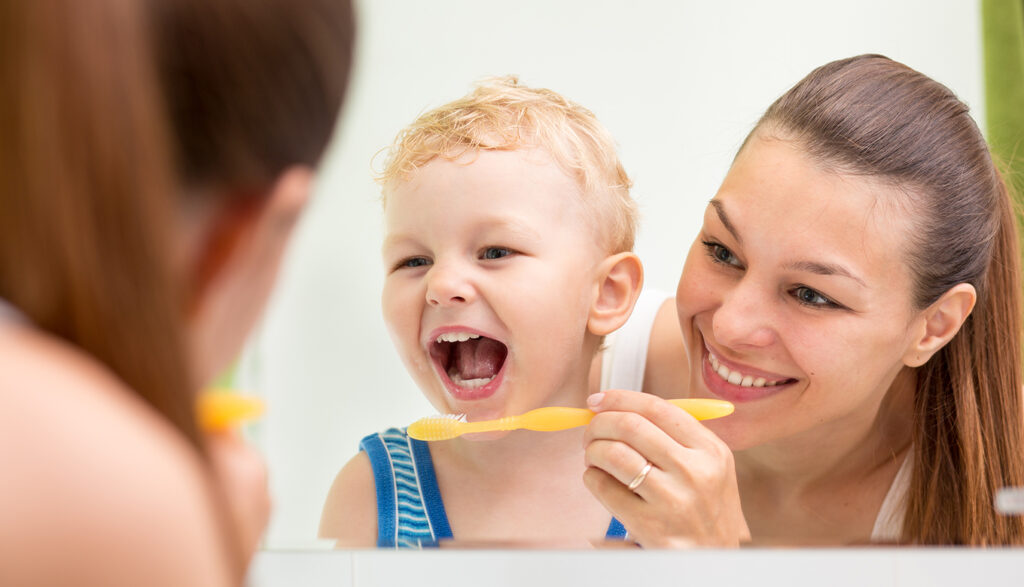
One of the best sights in the world is the smile of your child. As a parent, it is important to help your child develop healthy dental habits – not only to help your child develop strong teeth but to help foster a lifetime of smiles! In this guide, we will cover the basics of dental care for kids, from that very first dental visit to preventing anxiety and building great habits at home!
What’s the right age for a child to have their first visit to the dentist?
The American Academy of Pediatric Dentistry recommends your child see a dentist before their first birthday, or at the latest, within six months of the first tooth coming into the mouth. The benefits of bringing your child to the dentist at an early age are:
• The dentist will be able monitor their early tooth development.
• Any potential problems can be addressed early before they become more difficult to treat.
• A relationship can be built between the dentist and the child to help with future dental care visits.
• Parents will be educated about proper oral hygiene techniques at home.
Regularly seeing the dentist every six months will help to eliminate many potential larger problems later in your child’s life, and make it easier for your child to come for these appointments as more a normal part of their routine.
Common Dental Issues in Children
Many dental disorders could arise in children. Here are some reminders for families to consider:
1. Cavities (Tooth Decay) – Caries is one of the most common chronic diseases that children get from plaque and an unhealthy sugary diet. A child can get caries on a tooth as early as six to twelve months old. Depending on the location and size of the cavity, the caries is generally (but not always) asymptomatic; however, children need to be checked regularly by a dentist to catch caries early when they should be an easily managed concern.
2. Thumb sucking and pacifiers – Every child sucks fingers, and every parent uses pacifiers to pacify their child; however, before age four, habitually sucking a thumb and extended use of a pacifier will probably cause an undesirable change in jaw development and dental alignment.
3. Teething – Teething is generally associated with too much drool, grumpiness, and biting. Parents can help to relieve some of the discomfort that a child may have during teething by giving them cool and hard rubbery toys or cold washcloths to bite on.
How to Teach Kids to Brush and Floss
A fun and reliable oral hygiene routine at home is very important!
For Brushing:
• The earlier you start to brush their teeth, the better! Start brushing as soon as the first tooth comes in.
• Children under the age of 3 years : should use a soft-bristled toothbrush with less than a pea-sized smear of fluoride toothpaste.
• Children ages 3 years and older should use fluoride toothpaste with less than a pea-sized amount.
• Brush with 2 minutes for morning and night for two times a day.
Pro Tip – let your child choose their toothbrush with a character from a movie they like or sing a brushing song!
For Flossing:
• Floss when any two teeth contact.
• Use a child appropriate flosser so it will be safer and more fun!
• Help supervise to obtain effective technique, until your child can adequately use proper technique (usually ages 7-8).
Preventing Dental Anxiety in Children
Dental anxiety can often be largely related to fear of the unknown. Here are some steps for reducing dental anxiety:
• The sooner a child starts visiting for oral health visits the less time. there is for anxiety to build, and the better they will adapt.
• You can practice being the dentist at home. so your child grows accustomed to someone looking in their mouth to count teeth.
• Choosing vocabulary: It is detrimental to use the words “hurt”, “pain” or “injection” when talking about the dentist.
• You can oftentimes read books together or watch a cartoon about a visit to the dentist to help alleviate anxiety around visits to the dentist. and building a positive and fun association to dental visits.
• Offering appropriate rewards for coping behaviours, praising your child for his or her compliance or adding them to a sticker chart.
Importance of Diet and Oral Health of Young Children
Diet is the largest aspect affecting the prevention of cavities and keeping teeth strong and healthy.
Healthier options to promote dental health:
• Cheese, milk, and yogurt are high in calcium
• Crunchy fruits and vegetables like apples, carrots, and celery will help clean teeth
• Water will help rinse the mouth and aid in buffering acid processes.
Things to avoid:
• Sugary sweets and drinks
Establishing a strong dental routine early not only keeps your child’s teeth healthy but also sets the foundation for lifelong oral wellness. From the first tooth to the first lost one—and beyond—your involvement, encouragement, and knowledge make all the difference.
Regular dental visits, daily brushing and flossing, a tooth-friendly diet, and a calm approach to dental care can help your child grow up smiling confidently.

